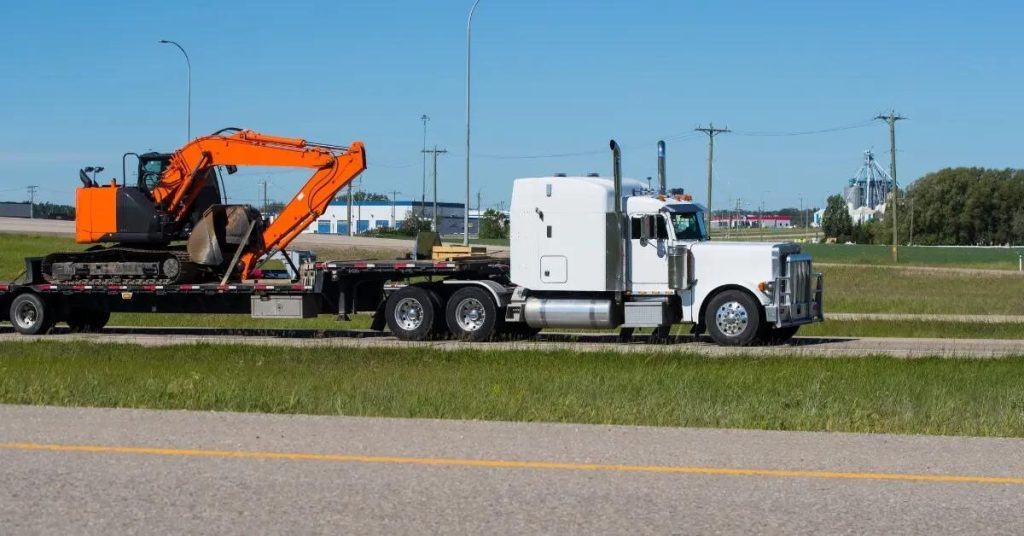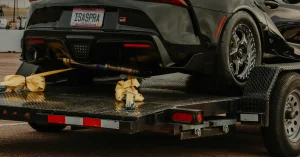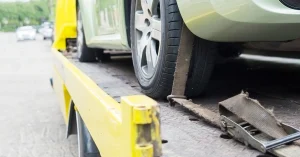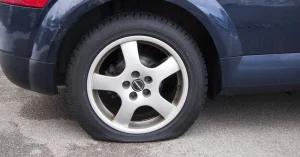Heavy machinery towing is more than just moving oversized equipment-it’s a critical service for construction, agriculture, and industrial operations. Whether it’s hauling bulldozers, cranes, or other heavy equipment, the process demands careful planning, specialized tools, and precise execution to ensure safety and compliance.
If you need professional heavy-duty towing services to transport large machinery safely, Geyers Towing’s Heavy-Duty Towing team has the expertise and equipment to handle even the toughest jobs.
In this guide, we’ll break down the complexities of heavy machinery towing, explore the cost factors, highlight safety tips, and explain how to handle long-distance transport effectively. By the end, you’ll have the knowledge to approach heavy machinery towing with confidence and efficiency.
Let’s dive into what makes heavy machinery towing work-and how you can do it right!
Unraveling the Complexities of Heavy Machinery Towing

Heavy machinery towing is far more complex than simply transporting large equipment. It requires specialized trucks, experienced operators, and a deep understanding of safety protocols. From hauling construction cranes to recovering stuck bulldozers, this service involves precision planning, compliance with regulations, and the ability to handle oversized or inoperable loads safely. Understanding the differences between heavy-duty and light-duty towing can help clarify why heavy machinery towing demands more advanced equipment and expertise.
Types of Heavy-Duty Towing and Recovery Services
Heavy-duty towing isn’t just about moving big machines-it’s a specialized service that tackles the challenges of oversized loads, damaged equipment recovery, and logistical planning. With the sheer size and weight involved, this process demands expert knowledge, robust equipment, and advanced techniques. Learn more about how heavy-duty towing is evolving to meet modern demands and industry challenges.
Beyond basic transport, heavy-duty towing can also include recovery services for stuck machinery and planning routes for over-dimensional loads that require permits and escorts. Operators must be highly skilled to handle these tasks efficiently while ensuring safety throughout the process.
Moving Beyond Conventional Tow Truck Services
If you think heavy-duty towing is just a larger version of standard towing, think again. Transporting construction cranes, excavators, and bulldozers often involves specialized rigs, hydraulic lifts, and experienced personnel.
Additionally, operators must adhere to weight limits, height clearances, and state-specific permits to avoid penalties. Failure to comply with these regulations can lead to delays, fines, or even accidents. That’s why it’s essential to work with professionals who understand the intricacies of heavy equipment towing and legal compliance.
Navigating Legal and Regulatory Challenges
Heavy machinery towing doesn’t stop at loading and unloading-it also involves navigating strict transportation regulations. Transporting oversized loads often requires permits, police escorts, and route planning to avoid low-clearance bridges or weight-restricted roads.
Professional dispatchers carefully analyze:
- Road conditions to avoid potholes or narrow lanes.
- Weather forecasts for wind, rain, or snow that may affect stability.
- Traffic laws to ensure compliance with local, state, and federal guidelines.
This level of planning reduces risks, prevents costly fines, and ensures timely delivery of equipment. Expert teams like Geyers Towing handle these hurdles seamlessly, prioritizing safety and efficiency at every step.
Exploring Heavy Machinery Towing Services
The world of heavy machinery towing is extensive, offering a wide range of services. It is imperative to comprehend the various kinds to select the most appropriate one for your specific requirements.
Towing Services for Wheeled Equipment
Wheeled equipment towing typically involves using hook-and-chain or wheel-lift tow trucks designed to handle machinery that can roll but may not be suitable for long-distance travel.
These towing methods are ideal for transporting construction machines like loaders, graders, and tractors. Even though these machines have wheels, they often require professional towing for long distances, difficult terrains, or emergencies.
Additionally, heavy-duty winching services play a key role in assisting wheeled machinery that may be stuck in mud, ditches, or construction sites, providing the power needed for recovery and repositioning.
Towing Services for Non-Wheeled Equipment
Non-wheeled machinery, such as generators, industrial plant components, pipes, or tanks, requires flatbed towing solutions for safe transport.
Flatbeds offer a secure platform to load oversized or stationary equipment that cannot move on its own. These loads often need specialized securing methods like straps and chains to prevent shifting during transit.
In some cases, winching services may also be required to position the equipment onto the flatbed, especially when dealing with irregularly shaped machinery or heavy loads that need precision maneuvering.
Decoding the Costs of Heavy Machinery Towing
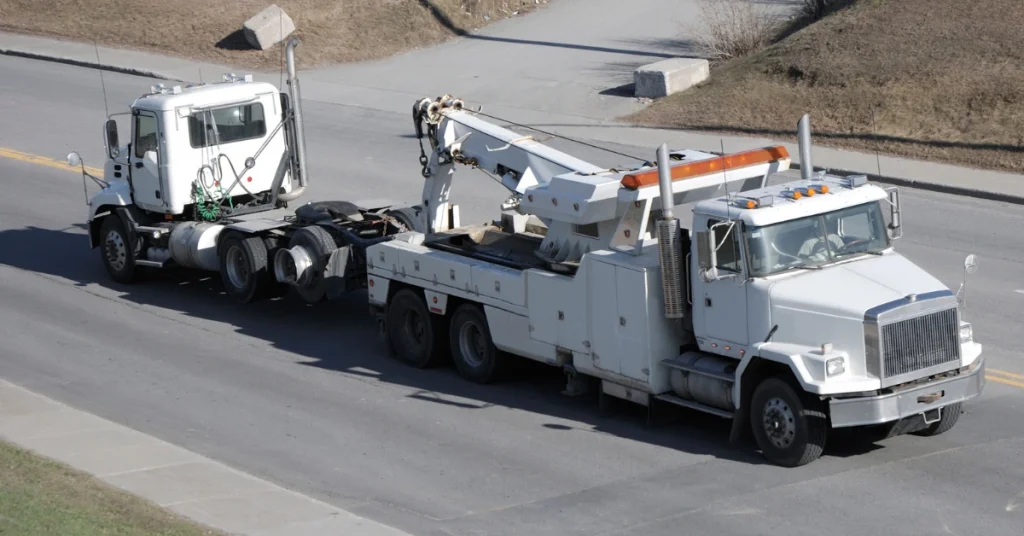
Got some big machinery that needs moving? The first question most people ask is, “How much will it cost?”
The truth is, there’s no one-size-fits-all answer when it comes to towing large equipment. Several factors determine pricing, and understanding these variables can help you plan ahead and manage expenses effectively.
Key Factors That Influence Pricing
The distance covered plays a big role in cost. Hauling heavy equipment across Maryland might not be as quick or affordable as you’d expect. It requires specialized vehicles and hours on the road, both of which add up.
- Hourly Tow Rates: Rates often start at $100 per hour but can easily exceed $1,000 depending on the size and complexity of the machinery.
- Non-Operational Equipment: If your equipment isn’t functional, the process becomes more complicated. Loading and unloading may require winching or crane services, which increase costs.
- Preparation Time: Safety inspections and proper securing of the load are crucial for avoiding damage but also add labor hours and costs.
What to Keep in Mind
Whether you’re moving equipment locally or over long distances, being prepared for potential variables can save you time and money. Costs can fluctuate based on equipment condition, distance, and special handling requirements.
Getting an accurate quote from experienced professionals ensures there are no surprises along the way.
Dealing with Inoperable Heavy Equipment
Towing non-functional hefty apparatus is a laborious job, yet it can be managed with the right equipment and expertise. Companies like Geyers Towing specialize in providing services for this exact situation. Our roadside assistance services are equipped to handle heavy machinery breakdowns, ensuring quick and reliable support when you need it most.
Can Inoperable Heavy Equipment Be Towed?
Absolutely. Geyers Towing has cranes that can lift even the heaviest machines onto trailers, making the process of moving broken-down equipment seem almost effortless. Safety is a top priority, so the crane’s size and weight capacity must be sufficient to handle the load.
Duty Winching Service: A Game-Changer
Cranes are not the only heroes in this scenario. Duty winching service also plays a crucial role in dealing with inoperative heavy machinery.
These winches allow for precise control of pulling force, enabling the accurate positioning of bulky machines on trailers. This level of control is essential to prevent damage during transit and ensure smooth unloading at the destination site.
Transporting heavy machinery is not just about getting from point A to point B. Proper placement is vital to avoid any potential damage and ensure a seamless unloading process. Learn more about Geyers Towing’s heavy-duty towing capabilities.
8 Essential Safety Tips and Checks for Heavy Machinery Towing
When it comes to heavy machinery towing, safety is paramount. Ensuring the secure transportation of large and heavy equipment requires meticulous planning and adherence to safety protocols. Proper training, the right tools, and proven safety measures for heavy-duty towing are essential for reducing risks and maintaining compliance.Here are some key safety tips and checks that should be considered:
1. Pre-Towing Inspection
Before any towing operation, conduct a thorough inspection of the heavy machinery. Check for any loose parts, leaks, or damage that could pose a risk during transportation. Ensure that all machinery parts are secured and stabilized.
2. Appropriate Towing Equipment
Use towing equipment that is specifically designed for heavy machinery. This includes robust tow trucks, trailers, and securing devices like chains, straps, and winches. Verify that the towing equipment can handle the weight and size of the machinery being transported.
3. Load Distribution and Securing
Properly distribute the weight of the machinery on the trailer to maintain balance. Secure the load using appropriate restraints to prevent any movement during transit. Double-check all attachment points to ensure they are tight and secure.
4. Route Planning
Plan the route carefully, considering factors like road conditions, traffic, and any potential obstacles. Avoid routes with sharp turns, steep inclines, or low-clearance bridges that could pose risks for heavy loads.
5. Compliance with Regulations
Adhere to all relevant transportation regulations, including weight limits, size restrictions, and necessary permits. Ensure that the towing process complies with local, state, and federal laws to avoid legal issues and ensure road safety.
6. Trained Personnel
Only qualified and experienced operators should handle heavy machinery towing. They should be trained in safe towing practices, emergency procedures, and the specific requirements of the equipment being towed.
7. Regular Maintenance of Towing Equipment
Regularly maintain and inspect towing vehicles and equipment. This includes checking brakes, tires, lights, and other critical components to ensure they are in good working condition.
8. Emergency Preparedness
Be prepared for emergencies. Equip towing vehicles with necessary safety gear, including fire extinguishers, warning triangles, and first-aid kits. Have a contingency plan in case of breakdowns or accidents.
By incorporating these safety tips and checks into your heavy machinery towing operations, you can significantly reduce the risk of accidents and ensure the safe and efficient transportation of heavy equipment.
Long Distance Towing for Heavy Equipment: A Comprehensive Guide
Have you ever wondered if heavy equipment can be towed over long distances? Yes, long-distance towing of heavy equipment is possible, yet several complexities must be taken into account.
The Complexities of Long-Haul Transportation
Towing large machinery over long distances is no easy task. It requires expertise and resources that not every company possesses. You must navigate through varying transport regulations from state to state, plan efficient routes, and ensure the safety of your valuable cargo during transit.
While many companies specialize in local towing services, finding an experienced long-distance mover can be challenging. That’s why we recommend professionals like Geyers Towing, who have mastered both local and long-haul transportation of heavy machinery.
Managing Costs in Long-Distance Towing
The cost of moving your heavy equipment across vast distances is another crucial consideration. Pricing can vary significantly depending on factors such as the type of machine being transported, its weight, dimensions, and the distance covered during transit.
In addition to these variables, toll fees along certain highways can quickly add up, making it difficult to estimate costs without guidance or experience. It’s also important to note that truck size and weight regulations may require separate haul transportation for extremely bulky items or machines that exceed federal limits, further complicating matters.
However, with careful planning and selecting the right service provider, all these challenges can be managed effectively.
The Bottom Line: Heavy Machinery Towing Made Simple
You’ve now explored the ins and outs of heavy machinery towing-from wheeled vs. non-wheeled transport to managing costs and tackling long-distance hauls.
Understanding the unique needs of each type of equipment, the pricing variables, and even solutions for inoperable machinery ensures you’re prepared for any scenario.
Whether you’re dealing with local or cross-state transportation, having a reliable partner like Geyers Towing can make all the difference.
Contact Geyers Towing for Expert Heavy Machinery Transport
Need professional heavy machinery towing services in Maryland? Look no further than Geyers Towing.
Our experienced team specializes in local and long-distance transport, handling wheeled and non-wheeled equipment with precision and care.
- 24/7 Emergency Services – We’re available whenever you need us.
- Fully Equipped Fleet – Ready for any heavy-duty task.
- Trusted by Maryland Businesses – Proven reliability and expertise.
Call (301) 298-8519 now or visit our contact page to schedule your service today!
Frequently Asked Questions About Heavy Machinery Towing
1. What is heavy machinery towing, and how does it work?
Heavy machinery towing involves the transportation of oversized or heavy equipment, such as construction machines, industrial tools, and vehicles. It requires specialized tow trucks, flatbeds, and winching systems to safely haul equipment. Professional operators plan routes, secure loads, and comply with safety regulations to ensure a smooth and secure transport process.
2. Can non-operational heavy machinery be towed?
Yes, non-operational heavy machinery can be towed using cranes, winching systems, and flatbed trailers. These tools help safely load and transport broken-down equipment, even if it cannot move under its own power. Companies like Geyers Towing specialize in handling such cases with precision and safety.
3. How much does heavy machinery towing cost?
The cost of heavy machinery towing varies based on factors such as distance, equipment size, weight, and condition. Rates may start at $100 per hour but can exceed $1,000 for complex jobs involving long distances or non-operational machinery. Additional costs may include permits, toll fees, and specialized loading equipment.
4. Is it possible to tow heavy machinery over long distances?
Yes, long-distance towing is possible but requires careful planning. It involves complying with state-specific transport laws, securing proper permits, and accounting for route challenges like low-clearance bridges or weight restrictions. Professionals like Geyers Towing manage these logistics to ensure a safe and efficient move.
5. What’s the difference between wheeled and non-wheeled heavy equipment towing?
Wheeled equipment can often be towed using hook-and-chain or wheel-lift systems, making it easier to transport. Non-wheeled equipment, such as generators or industrial components, requires flatbed trucks or trailers for loading and hauling. Each method depends on the equipment type, size, and condition.

